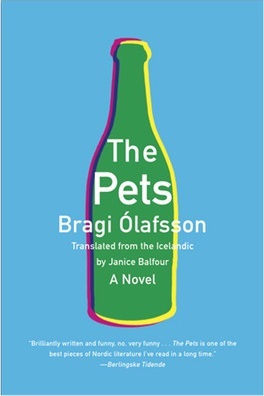Bragi Ólafsson’s The Pets (2001) is the second release from Open Letter Books (Dubravka Ugrešić’s Nobody’s Home was the first) and their first piece of fiction. While it’s the first significant English translation for Ólafsson, he has been busying himself with poems, plays, short stories and novels since 1986, not to mention his stint as bass player for Icelandic band, The Sugarcubes, fronted by Björk.
At the beginning of The Pets, Emil Halldorsson, who has recently come into some money, returns home from a brief trip to London to stock up on CDs and duty free, to find his neighbour informing him that a man had visited earlier, saying he would return later. This sets up the opening chapters where we alternate between the story of Emil’s flight, and all the interesting characters one meets – and sometimes would rather not – in such circumstances, and the journey of this mysterious visitor, and the scrapes he gets into, as he prepares to visit Emil.
The mysterious visitor is Havard Knutsson, an old acquaintance (sort of) of Emil’s from many years before, when both were housesitting in London. When the knock comes at the door, Emil has just put some coffee on and is typing an email to his partner. Rather than answer the door, Emil peers out the window and is shocked to recognise Havard, who he believed was safely locked away in a Swedish institution. Not wanting to confront him, Emil’s reaction sets up the remainder of the novel:
I get down on my knees without even thinking, poke my head under the bed, and pull out a box of toys that belong to my son Halldor. I then lie down on the soft carpet, squeeze my body in under the bed, and pull the sheet down to the floor – to hide myself from the doorless entrance to the bedroom and from the window that faces the dim back garden.
Not one to be dissuaded by an unanswered door, Havard peers through the window, sees the coffee on, and breaks into Emil’s house, and turns it off. The signs are that Emil must have nipped out and can’t be long in coming back, so he decides to wait for him. As time drags by, Havard settles more into the house, playing Emil’s CDs, answering his telephone, and inviting his friends and some others from the opening chapters round for a party.
I suddenly realize very clearly the ridiculous position I am in and carry on thinking about the problems that one creates for oneself by getting to know various people. One shouldn’t let others into one’s life.
Being under the bed, with only a limited view of what’s going on in his, Emil’s narrative focuses more on the other senses. He overhears conversations and takes in smells, guessing at what’s happening or what people are talking about. Stuck in such a position, Emil finds himself recalling the aforementioned time in London.
I had always known that Havard and I would never become very good friends but during the days we spent in London an unbridgeable rift had developed between us. I was the healthy one, the one who had interests and wanted to be constructive, even if just in terms of building a collection of CDs or books; Havard, on the other hand, didn’t seem to be interested in anything, unless it was forbidden or contained the highest percentage of alcohol.
The titular pets are crucial to the London backstory, a disastrous time that saw them meet their maker in comically inventive ways, with a little help from Havard. The lack of action in preventing such incidents mirror Emil’s current situation, revealing as he does a huge character flaw:
Why on earth don’t I do something? What is wrong with me? What reason do I have for lying here under my own bed while these two men…behave as if they are at home here; it seems as though they are at home, in my very own flat. The only reason I don’t do anything is because it is too late.
Emil’s lack of action, never being assertive, finds himself allowing others to take advantage of him. Never able to put his foot down, events transpire, and he’s left picking up the pieces in the aftermath.
While the opening chapters are necessary in setting up Havard’s bizarre party, there’s the sense that their sequence is drawn out. At one point Havard visits an old friend who later turns up at Emil’s, a thread that soon fizzles out with little contribution to the main story. That aside, the novel is a quite an enjoyable read once the main premise comes around and we are reduced to the narrow narrative from under Emil’s bed.
There’s nothing flashy in Ólafsson’s prose, his style straightforwardly recounting events and highlighting thoughts. Where he excels is in his comic setup. Most of the seeds introduced come together in this darkly comic novel to a snappy and funny conclusion, but, let it linger, and the underlying tragedy soon reveals itself.

I love this: “One shouldn’t let others into one’s life.” All is lost once you do that!